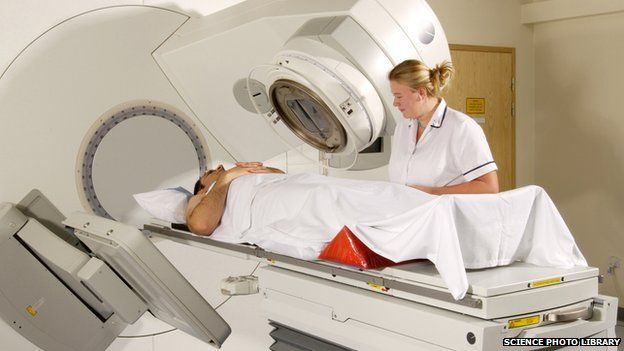Ashya King case: What is proton beam therapy?
- Published

The parents of a boy with a brain tumour have said they removed their son from a UK hospital because he had not been offered proton beam therapy.
In a video posted on YouTube, Brett and Naghemeh King said they had "pleaded" with staff at Southampton General Hospital for their five-year-old son Ashya to be given it.
The technology is currently only available in the UK to treat eye cancers, but patients with other forms of cancer can apply for NHS funding for therapy abroad.
So what is proton beam therapy?
Animated graphic comparing traditional radiation treatment with proton beam therapy.
The treatment is a type of radiation therapy that uses beams of protons - or small parts of atoms - rather than high energy X-rays, as with conventional radiotherapy.
The protons can be directed at a tumour more precisely than X-rays and unlike conventional treatments the beams stop once they hit the target, rather than carrying on through the body.
Experts say this causes less damage to surrounding tissue and reduces side-effects.
Matthew Crocker, a consultant neurosurgeon at St George's Healthcare, in London, said conventional radiotherapy had "a range of side-effects, partly because of the way that the energy is distributed".
He said proton beam therapy could be potentially successful for tumours "within the brain and central nervous-system".
NHS England says the treatment works best on "very rare cancers, including tumours affecting the base of the skull or the spine", and is "particularly suitable to specific complex childhood cancers".
Panel decides
Currently, the only facility that offers proton beam therapy in the UK - Clatterbridge Centre for Cancer NHS Foundation Trust, in Wirral - treats rare cancers of the eye.
The Department of Health says that from April 2018 the treatment will be offered to up to 1,500 cancer patients at hospitals in London and Manchester, following investment worth £250m.
Until then, it says the NHS will continue to fund selected patients to be sent for treatment in other countries, including Switzerland and the US.
Individual cases are put forward by consultants who submit a form for review by a clinical panel, the NHS says.
The panel then decides whether the patient is suitable for proton beam therapy.
Since establishing a programme to send patients overseas in 2008, the NHS says 412 patients out of 546 referrals have been approved for the treatment, including 293 children.
However, the treatment is very expensive.
The NHS estimates the average cost of the treatment to be £100,000 per patient.
Families of patients who have not received NHS funding have often been left having to raise thousands of pounds to pay for the treatment themselves.
Charities say, even if funding is approved, families should be aware of extra costs involved including any additional medical treatment, and accommodation and living expenses for family members.
'Worst time ever'
Tracy Laycock said her son Morgan was approved for NHS funding to cover his treatment in the US state of Oklahoma, after he developed a tumour on his face.
She said waiting to hear from the NHS panel was "just the worst time ever".
"We nearly didn't get it because Morgan was classed as being too old so we had a bit of a carrot-dangling situation where [they said] yes you could have it but he might not get it if a younger child had come along," she said.
Tracy Laycock speaks about proton beam therapy which was given to her son, Morgan
"We already had a family discussion before that and we would have sold everything to fund it privately if we couldn't have it done [through the NHS]."
Announcing the decision in October 2012 to develop two proton beam therapy centres in the UK, the Department of Health said there was a "clear need to develop services in this country".
It estimated that, until then, the NHS would be spending about £30m a year treating up to 400 patients overseas, adding that costs had "increased as the international demand increases".
- Published31 August 2014
- Published5 April 2012
- Published13 December 2011
- Published15 March 2013